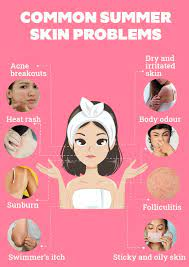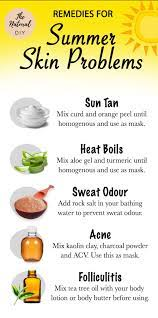Skin Diseases and Their Treatment in Hot Summer
The scorching summer heat can exacerbate various skin conditions, making it essential to understand common skin diseases and their treatments. Here are some prevalent skin conditions during hot summers and the recommended approaches for managing them:
Sunburn: Sunburn occurs when the skin is exposed to excessive ultraviolet (UV) radiation. To prevent sunburn, apply a broad-spectrum sunscreen with a high sun protection factor (SPF) before going outside. If sunburn does occur, cool the affected area with cold compresses, moisturize with aloe vera gel, and take over-the-counter pain relievers if necessary.
Heat Rash: Heat rash, also known as prickly heat, results from sweat ducts becoming blocked, leading to small, itchy red bumps. To alleviate heat rash, keep the affected area cool and dry. Wear loose-fitting clothing made from breathable fabrics, such as cotton. Calamine lotion or hydrocortisone cream can soothe itching and inflammation.
Heat Exhaustion: Heat exhaustion is a serious condition caused by prolonged exposure to high temperatures and inadequate fluid intake. Symptoms include dizziness, fatigue, nausea, and clammy skin. If you or someone experiences heat exhaustion, move to a cooler area, drink plenty of fluids, and apply cool compresses to the skin. Seek medical attention if symptoms persist or worsen.
Fungal Infections: Fungal infections thrive in warm, moist environments. Common types include athlete's foot, jock itch, and yeast infections. Keep the affected areas clean and dry, wear breathable footwear, and avoid sharing personal items. Over-the-counter antifungal creams or powders are typically effective, but severe or persistent cases may require prescription medications.
Acne Breakouts: Hot weather can increase sweat production, oil production, and clog pores, leading to acne breakouts. Wash your face twice daily with a gentle cleanser and avoid scrubbing or picking at acne lesions. Use oil-free, non-comedogenic moisturizers and wear lightweight, oil-free sunscreen. If over-the-counter treatments do not improve your acne, consult a dermatologist.
Pruritus (Itchy Skin): Dry skin and increased sweating can cause pruritus or itchy skin during summer. Keep your skin well moisturized with fragrance-free lotions or creams. Avoid hot showers or baths that can further dry out the skin. If itching persists, an over-the-counter antihistamine or hydrocortisone cream can provide relief. Consult a healthcare professional if symptoms worsen.
Remember to stay hydrated, seek shade during peak sun hours, and wear protective clothing and accessories like hats and sunglasses. If you experience severe or persistent symptoms, it's important to consult a healthcare professional or dermatologist for a proper diagnosis and personalized treatment plan.
Please note that this information is for general guidance only and should not replace professional medical advice




No comments:
Post a Comment